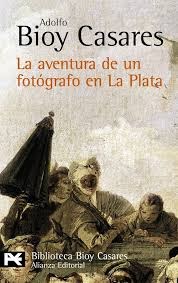
Original Language: castellano
Year of publication: 1985
Valoración: Highly recommended
I begin to be clear that I have to return more frequently to which I had a bit cornered, even more so if it is South American literature, with its prose, its peculiar language (which I enjoy the more marked) and that point of differential sensitivity that transcends scenarios, arguments or accent, which I believe that it responds to a point of view that has become autonomous, a kind of literary epigenetics that confers a character that confers a character that confers a character that confers a character that confers a character that confers a character that confers a character that confers a character that confers a character that confers a character that confers a character. Singular. Poor Bioy Casares had not only a little lost among the shelves but was not too close to my personal top, where several of his compatriots live.
That scarce expectation is quick, in just a few pages, when the little story of Nicolás Almanzaa young photographer who accepts the commission to obtain significant images of the city of La Plata. The boy arrives at his destiny feeling foreigner, with hardly any money, immediately coming into contact with the family Lombardofather and two daughters of good see, who are going to act as companions and protectors in a relationship that reaches great intensity in an unusually brief time. This strange evolution awakens the suspicion of all the characters with which it will be related Almanzathat advise him to be cautious and distrust, as if they already knew the Lombardo or would have lived similar situations.
Such a simple argument serves Bioy Casares to catch us quickly. The protagonist is alone, or almost, in an unknown city, it is true, but it could very well devote himself exclusively to his work and do without the relationship with the peculiar family. However, it does not, partly because of the attractiveness of the daughters, and also for the something mysterious arguments of the father, but above all, it seems to be, for a kind of self -imposed obligation by simple courtesy or good education.
It is something that is not entirely clear, nor why everyone gives the evil of the Lombardoand this uncertainty, the stupor in a confusing situation, does not leave the reader more option to continue feverishly looking for the truth, an outcome. It seems that we cannot support that permanent atmosphere of suspicion, and thus a seemingly harmless story becomes a source of doubts.
How something completely unfounded (or not?) It can become a reason for concern, why certain signs, perhaps fortuitous, may totally inanes, can cause fear and anxiety, will be questions that some political propagandists could answer. But if it is that these sensations reach the reader of a novel, the only person will be the author’s talent, which has at the same time the control to keep his main and temperate main character, without a bad gesture, conscious but at the same time voluntarily oblivious to the rumor and the recommendation.
Somehow all these misunderstandings and situations are resolved in those few very surprising final pages. Of course I am not going to gartain anything, but I think, in the simplicity of that outcome, each reader is enabled to provide an interpretation. It is something big to be able to let a story close in this way, as a real life scene that, seen from outside, presents so many questions. Why do they act like this? What really thought during their relationship? What can be the near future of these characters? What has meant for them everything we have known? If we do not read it we will not be able to answer these questions. And if we read it, probably either, or better, we can give ours, those of each reader, all possible but also surely wrong.
Source: https://unlibroaldia.blogspot.com/2025/05/adolfo-bioy-casares-la-aventura-de-un.html


